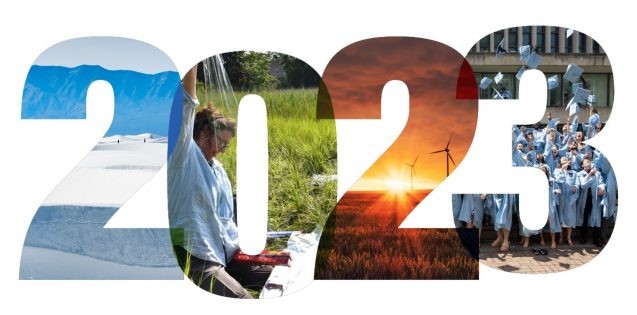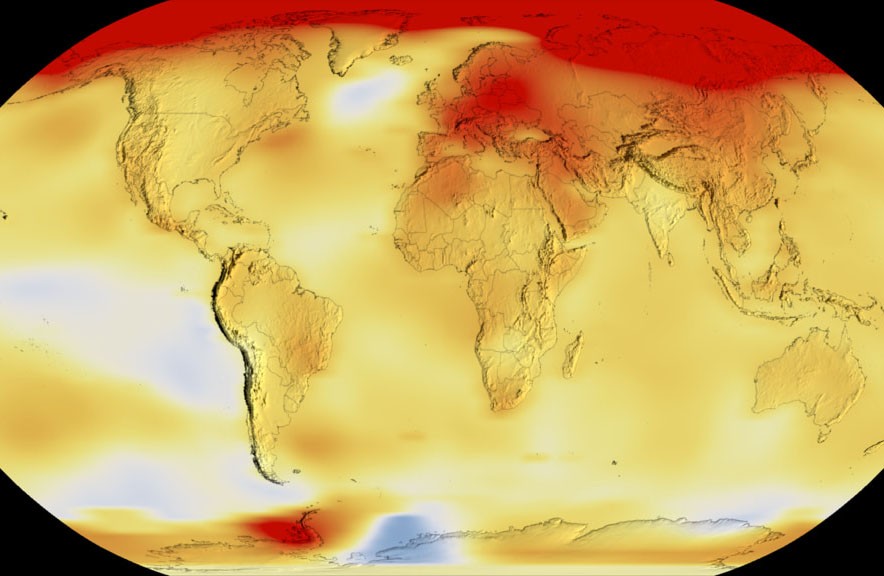Year in Review: Our Top Stories of 2023
In case you missed it: Check out this past year’s top stories, videos, research highlights and more.

2023 was one for the books—a record-breaking year for phenomena like deadly heat waves, massive wildfires and catastrophic floods. But it was also a year with historic wins like a landmark agreement to support a Loss and Damage fund, and an increasing focus on climate finance to help developing countries suffering the greatest impacts from a changing climate.
Researchers, scientists, policy experts, students and many others are working together to mitigate the effects of climate change, during events like Climate Week NYC, COP28 and Columbia Climate School’s Managed Retreat Conference, among other initiatives. And in 2023, more students than ever before graduated from the Columbia Climate School, ready to contribute their education and experiences to building a better future.
State of the Planet published hundreds of stories this year focusing on the current, past and future climate, as well as the individuals who help us understand and work toward a safer and more equitable future. You can read a short roundup of our most viewed articles below.
Some of Our Most Popular Posts From 2023

- AI’s Growing Carbon Footprint: Artificial intelligence has the potential to develop game-changing ways to fight climate change—but only if we can find ways to cut its own carbon emissions.
- The Paradox of Lithium: The clean energy transition depends heavily on lithium, but mining this element is not “clean.” How do we avoid falling into the same traps from which we are trying to free ourselves?
- Flooding in California: What Went Wrong, and What Comes Next: Climate School experts help to explain this devastating weather and what it means in the broader conversation of climate change and disaster response.
- Why the Earthquake in Turkey Still Matters: In October, eight months after Turkey’s devastating earthquake, over three million people were still looking for a place to call home.
- Vikings Abandoned Greenland Centuries Ago in Face of Rising Seas, Says New Study: Counterintuitively, seas were rising around Greenland as it went through a cold period centuries ago. This helped drive out Viking colonists, says new research.
- Climate Education in the U.S.: Where It Stands, and Why It Matters: Young people need to learn about climate change because it is going to shape their futures in many ways. What are they learning about it in school?
Most Covered in the Media

- 2022 Tied for Fifth Warmest Year. Last year saw a continuation of the long-term rise in the planet’s average temperature.
- Chasing Carbon Zero, an hourlong PBS special featured research director of the Center on Global Energy Policy Melissa Lott, and atmospheric scientist Róisín Commane of Lamont-Doherty Earth Observatory.
- World Temperatures Will Blow Past Paris Goals This Decade, Asserts New Study James Hansen warned the world in the 1980s that global warming was coming. Now, he is warning that it is barreling down even faster than expected.
- A New 66 Million-Year History of Carbon Dioxide Offers Little Comfort for Today Scientists have produced a new curve of how atmospheric carbon dioxide affects climate. It makes clear that its effects can be long lasting.
- Rising Seas Will Tighten Vise on Miami Even for People Who Are Not Flooded Most research on rising sea levels focuses on the direct effects of inundation. A new study adds social and economic vulnerabilities to the equation.
Video Highlights
We launched our Science for the Planet video series, featuring short explainers about how Climate School researchers are learning about the impacts of climate change.
- Botanist and climatologist Dorothy Peteet collects sediment cores from a New York City coastal marsh and explains how such ecosystems store massive amounts of carbon and why they are under threat from sea-level rise.
- With drones, geophysics and artificial intelligence, researchers prepare to do battle against land mines.
- Highlights From the 2023 Climate School Class Day and Commencement.
- Learn about the working lives of a paleooceanographer, a greenhouse gas chemist, and a cryospheric geophysicist.
That’s it for now. See you in 2024!
